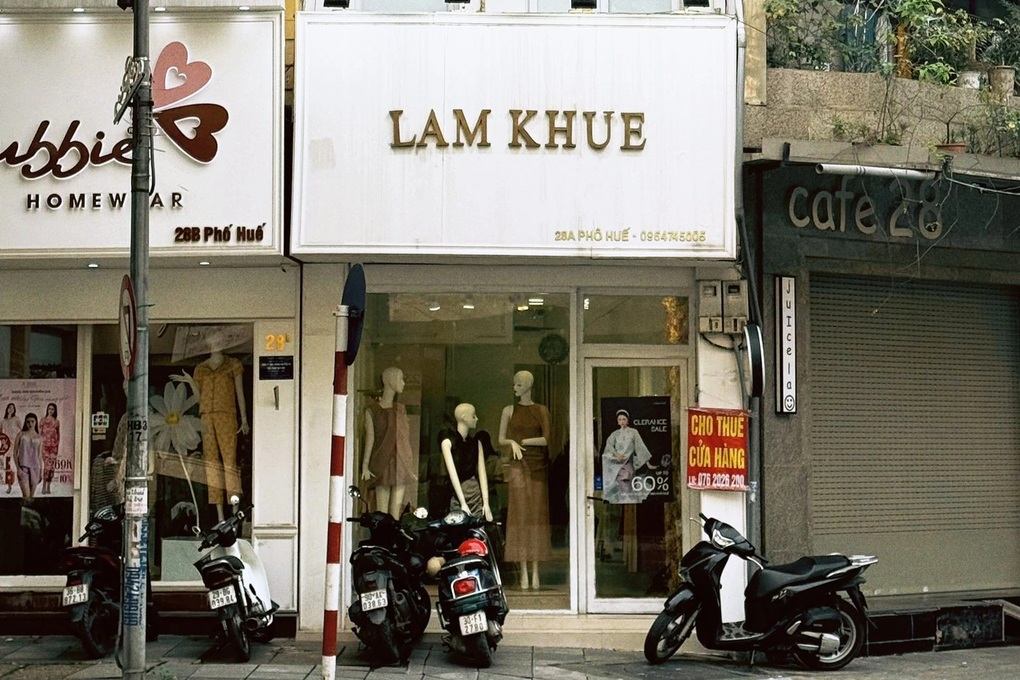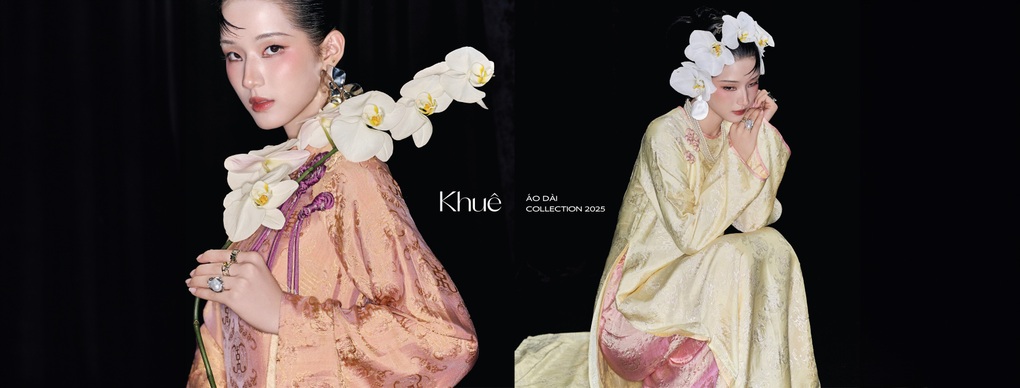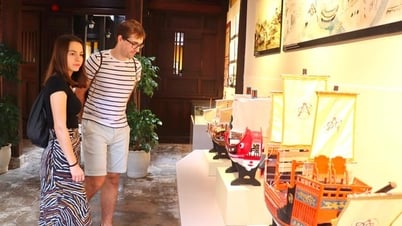Starting her business in 2017 with only 5 million VND, Ms. Huong Pham, founder of the Lam Khue Design brand, has gone through 8 years of ups and downs. From an office worker on maternity leave, she decided to pursue her favorite field to be proactive with her finances and time.
Five years ago, Lam Khue Design was valued at 8 billion VND by a partner with the intention of contributing capital. However, the last 2 years have been a difficult period for this local brand.
Ms. Huong admitted that she had been struggling to find many solutions from outside but they were ineffective, leading to her having to close the storefront at 28A Hue Street ( Hanoi ).

Ms. Huong Pham - founder of Lam Khue Design brand (Photo: Character provided).
The failure of the famous fashion brand for the past 8 years has surprised many people. The founder Huong Pham herself has spent a lot of time looking back at her journey. She realized that if she wants to revive the business, change needs to start from within, from looking back at herself, defining goals and especially improving her mindset.
“I used to think that being gentle with employees would create a fun environment, but now I understand that being strict helps them mature,” Ms. Huong shared.
The young businesswoman also abandoned the mindset of “shouldering everything” and boldly sought support. Since then, she has received a lot of help both materially and spiritually, especially after she wrote a candid article admitting past mistakes that caused the brand to close.
Through that, Ms. Huong Pham concluded 7 profound lessons, affirming that business failure does not come from lack of capacity or diligence, but from distorted thinking that can "sink the whole ship". These lessons are being widely shared on social networks.
In particular, thanks to the article, Ms. Huong also received a lot of sharing, sympathy and encouragement from the startup community, including Shark Binh (Nguyen Hoa Binh - Chairman of NextTech Group).
Specifically, the content of Ms. Huong Pham's article is as follows:

Lam Khue Design brand had to close down due to 7 past mistakes of the founder (Photo: Character provided).
1. Claiming that “tough market” is the main reason for declining business results
My catchphrase, that of the team, and I believe many people over the past year, has been: “The market is too tough.” And so we continue to do the same things, improving a little but not changing the core. Not looking back at the system from the product, the customer, or the message.
Believing that the main problem is external, there is no reason to change yourself. Still the same old design style, content creation, and operations, while customer psychology and behavior have changed.
This mistake comes from blaming instead of proactively changing and adapting. This belief limits our creativity and adaptability. It makes us more likely to accept doing our best without being effective, or to give up and wait for the market to improve. And blaming will never truly move forward.
2. No clear and consistent brand direction
Many founders start their brands with passion and manage them entirely by instinct. I, too, have not yet fully realized the importance of building a systematic system of values and brand philosophy. I have not clearly defined what my brand represents, who my ideal customers are, what my vision and mission are, what core values need to be preserved unchangingly…?
Things that may seem theoretical or beautiful on paper, but in fact are the compass that guides the entire strategy and actions of the brand in the long term.
Without this foundation, brands can easily get caught up in trends, or just get stuck in repetition, failing to create a lasting difference. The design is beautiful, but the brand lacks a story that makes customers want to accompany and support it for a long time.
Deeper down, I realized the reason why I couldn't orient my brand was because I didn't understand myself. For large corporations, a brand can be a system operated by many departments, but for local brands, the brand is the embodiment, the reflection of the founder.
When the founder’s true self matches what customers are looking for, it is an extremely solid foundation for building a brand. Because when the founder is true to himself, clearly positions himself, it will create a clear identity that cannot be copied, and when meeting the right customers, it will create an extremely strong connection.
3. Not setting clear, specific, and measurable goals
I used to run a business without specific KPIs. Everything was done by feeling and inertia, not knowing what was a priority, not knowing whether I or my staff were really doing well or not. I thought my business was about creativity, but now I understand that working closely with the goal does not destroy creativity, but it protects and guides creativity in the right direction.
This mistake comes from the romantic mindset of effort: “Just do your best and the results will come naturally”, which makes me procrastinate on planning, afraid to set KPIs, and afraid to face the numbers, and this fear of facing does not make reality better, it only makes us live in the illusion of effort.

The collapse of the Lam Khue Design brand has caused a stir among fashion enthusiasts (Photo: Character provided).
4. Loving the product so much that you forget that the product you make is to serve customers.
I believe this is a common mistake of many creative people, devoting most of their efforts to creating beautiful, unique designs based on personal feelings and aesthetic ideals, without taking into account the customer's perspective.
I forgot an important thing, customers don't just buy because it's beautiful, they buy because they need something "usable", a design that fits real life, can be applied in specific contexts, highlights who they are, not just highlights the designer's skills.
Many customers have told me: “So beautiful! But I don’t know where to wear it” and I have unintentionally turned those designs into “works to look at”, not “things to live with”.
The core misconception here is the belief that ideals and personal identity are the most important things. That if you keep them pure, sooner or later you will touch the hearts of others.
But it turns out, an ideal can only truly live when it has the ability to connect. We can maintain our identity, but we must know how to translate that identity into a language that customers can feel, understand, and want to carry with them. Otherwise, what we call "identity" is just an isolated oasis, the tighter we hold on, the lonelier we become.
5. Taking financial management lightly and not separating business and personal finances
From the beginning, I did not build a clear financial management system. Revenue and expenses were tracked in a sketchy way, there was a lack of specific financial reports, no cash flow planning, no measurement of gross profit or net profit on each product, no mindset of controlling budgets by month, by campaign or by specific goals.
Seeing that my account always had enough money to buy raw materials and pay my salary, I thought I was fine. Whenever I was short of money, I would find a way to make more money, without checking where the money was going. And because I didn't separate my personal and business finances, I never had a clear view of the true effectiveness of my business.
This wrong action originated from the fact that I thought I appreciated money because I always worked hard and did not spend lavishly, but in reality, I did not appreciate money in the most meaningful way.
A deep respect for money lies in the ability to manage it, not in “earning more” or “spending less”. If you don’t know how to manage money, it’s like building a house on sand, just a small wave is enough to wash away all your efforts.
6. Not knowing how to “clone yourself”, because you don’t understand the importance of training and don’t dare to be strict with your staff.
When I first started my business, I did everything by myself and of course I did it myself so it was always to my liking and to my standards.
As the business grew, I didn't know how to get others to do what I did, so I didn't spend time training staff or systematizing the way I worked, because I didn't understand that empowering and training were the ways to spread my values and standards, helping the business grow.
Worse, I was not strict with my staff because I was afraid of hurting them, afraid of them quitting, afraid of firing people because of pity, afraid of being judged as harsh. And then I chose the easier way, silently doing things for them, letting them do as they please and accepting them to change slowly. But that is the fastest way for a leader to burn out and create a loyal but immature team.
This mistake is probably also made by many people who want to lead with a loving heart, living emotionally, stemming from the belief that “being strict, disciplining, or abandoning others is cruel, is hurting them”.
I always want to create a warm, comfortable, and pleasant environment because I myself am under too much pressure in life and I don’t want anyone to go through that like me. And deeper, I am afraid of conflict because I don’t want to be a “bad person”, but in fact, I do bad things, because I didn’t give them the opportunity to grow, and didn’t make my business develop.

Design by Lam Khue brand (Photo: Lam Khue Design).
7. Not building a personal brand, despite knowing that the founder himself is a powerful communication channel
The above mistakes were all made because I didn’t really understand them, but with the 7th mistake, I understood it very well but why I still didn’t do it. I spent all my time and mind building the Lam Khue brand, but for a long time, I almost hid myself, didn’t share about the creative journey, didn’t appear, didn’t stand up to tell the story behind each design or the ideal I pursued.
The market today is no longer the same, customers do not just buy products, they buy trust, buy stories, buy the people behind the brand, and the person who can do that best is none other than the founder. But even though I know, why have I never really stepped out?
Now I understand, the root cause is because I was obsessed with “perfection”, I thought I had to wait until I was good enough, good enough, and achieved brilliant results before sharing.
I was afraid of losing my image, but I forgot that deep connection does not come from perfection, but from authenticity. That it is the founders who dare to tell their real story, share their imperfect journey, talk about mistakes, failures, dare to be present with all that they have that can create the most profound impact.
***
The end of the Lam Khue Design brand was not a fall that made Ms. Huong Pham give up, but a turning point for her to start over, with mature awareness, systematic methods and profound lessons.
Ms. Huong shared: "This is not starting from zero, but starting after I understood myself. I will soon return to build the brand in the right direction."
After experiencing bitter failure, Ms. Phuong decided to develop her fashion brand in parallel with her own development.
"My brand will have two main directions of development. The first is to represent the original values of our country, through Ao Dai products and hand-sewn embellishments. The second is to represent femininity," Ms. Huong added.
Source: https://dantri.com.vn/giai-tri/thuong-hieu-noi-tieng-8-nam-dong-cua-nha-sang-lap-thua-nhan-7-sai-lam-20250718093005790.htm































































































![[Infographic] In 2025, 47 products will achieve national OCOP](https://vphoto.vietnam.vn/thumb/402x226/vietnam/resource/IMAGE/2025/7/16/5d672398b0744db3ab920e05db8e5b7d)







Comment (0)